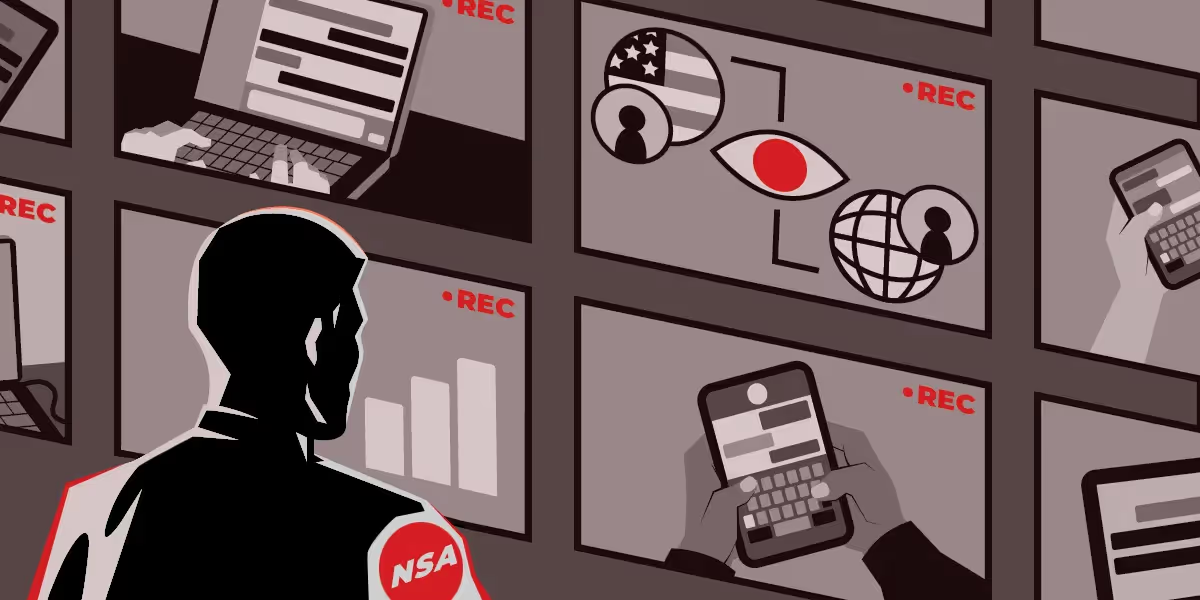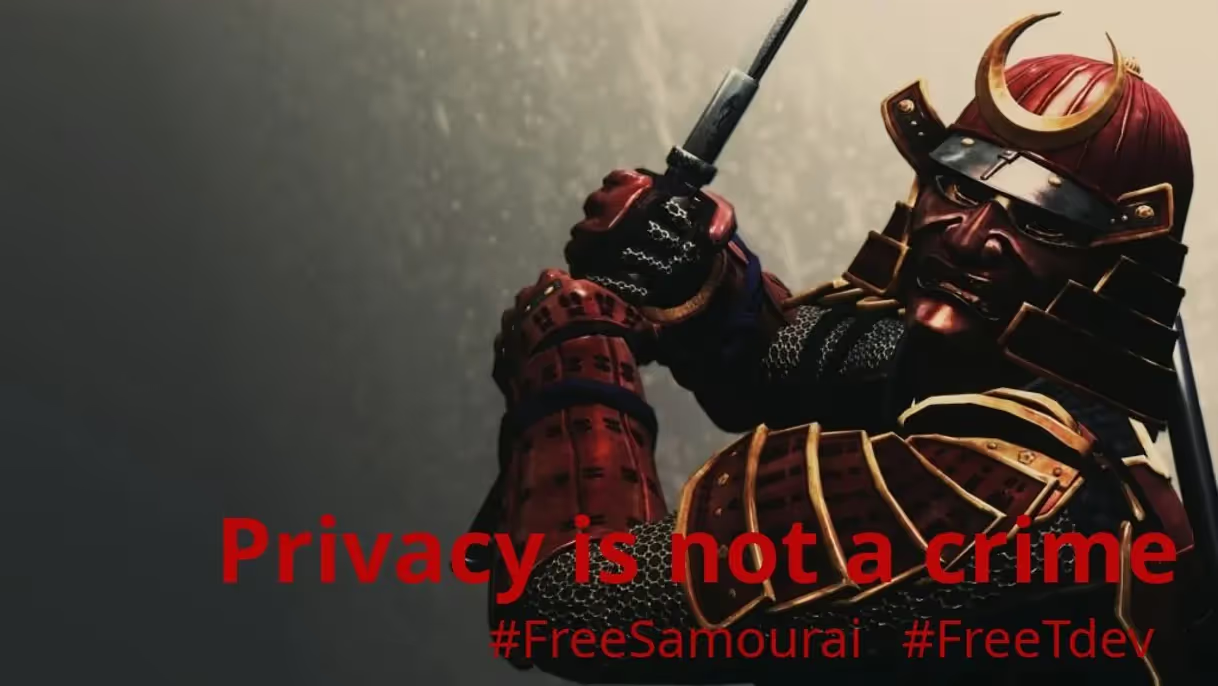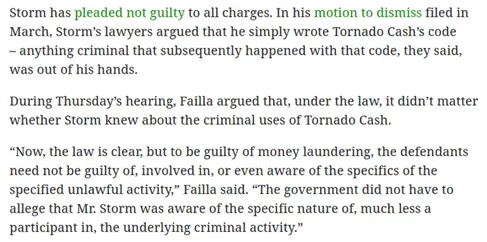The Ongoing War on Your Privacy
.avif)
In this article:
Privacy is an important component of freedom and is rightly considered a fundamental human right.
Without privacy, individual autonomy and self-expression are significantly eroded. If you know you’re being constantly monitored and judged, then you’re likely to feel more restricted in your actions and speech. If this erosion of your privacy is persistent and is applied to a broad population, then it also limits your exposure to the free expression of others.

Over time this curtailment of dialogue and behaviour can even lead to a restriction of thought. If the information you can consume and the actions you can perform become more limited and homogeneous, the opportunity for personal growth by being exposed to different ideas and behaviours starts to disappear.
This is detrimental to society.
Innovation and progress are almost always born from ideas that start at the fringe of conventional wisdom and emerge outside whatever dogma society is currently subscribed to. If we limit self-expression, then we limit innovation.

Clearly, this is not desirable. Humans flourish and society advances when people can communicate and transact with each other freely. Anything that acts as an impediment to this, including the erosion of privacy and freedom of expression, should be unequivocally rejected as a barrier to human progress.
So, in 2024 how do we find ourselves in the situation where we are collectively monitored and tracked more than at any other point during human history? If it’s truly detrimental to society, then how did we end up here and why?
Why is Our Privacy Under Attack?
The unfortunate answer to this question is quite a simple one. It’s all about control.
Ruling classes, be that monarchies or governments, have always sought to supress any movement or idea that might pose a threat to their power. Every politician wants to rule well…. but most of all, they want to rule.

This desire to rule at any cost creates incentives where those holding power will pursue outcomes that preserve their position, even at the expense of society as a whole.
Understanding this makes it easier to understand why as technology has rapidly advanced over the past century, Governments have eagerly embraced new opportunities to monitor and spy on the populations they govern.
By limiting privacy and freedom of expression, those in power can maintain control over the popular narrative and supress any form of dissent. This is a powerful tool to maintain a status quo that benefits them.

The idea that you might converse and transact privately with other citizens without the Government’s knowledge poses a real threat to this power. What if you were questioning authority or pointing out corruption? Worse still, what if you were privately discussing how to establish a competing political system or discussing ways to hold them more accountable? What if you started trading with each other without their oversight?
That Governments would fear you having privacy is completely logical when you realise that their main priority is the maintenance of their power.
And the results speak for themselves…
We now live in a world where governments, in collusion with big tech, routinely track all aspects of your online life including your internet traffic, social media activity and browsing history. If that wasn’t bad enough, even your movements and behaviour in public spaces is monitored using tools like facial recognition and GPS tracking.

Most governments today are hell bent on spying on their citizen’s movements and private communications and collect vast amounts of personal data without any explicit consent.
What should really concern us however is that despite the impressive surveillance architecture they have already built, they want to go much further. They want to stamp out privacy altogether and their recent behaviour belies their intent…
French Authorities Arrest Pavel Durov – CEO of Telegram
If you’ve been following the news at all recently, you will probably have heard that Pavel Durov, founder of ‘private’ messaging app Telegram, recently found himself in a tricky legal situation in the EU.
Pavel had flown to Paris only to be arrested and put under formal investigation by the French authorities. His charge? Suspected ‘complicity’ in allowing illicit transactions, drug trafficking, fraud, and the spread of child pornography.

Those are some extremely serious allegations and if Pavel was ever successfully charged and found guilty of these crimes, he could find himself imprisoned for a significant amount of time. Potentially even for life.
But what’s really going on here? What does it mean to be ‘complicit’ in these crimes, and how and why should Pavel be held accountable?
Asking yourself these questions quickly reveals the authorities’ true motives for arresting him.

Pavel of course was not being accused of committing these alleged crimes himself. He only stands accused of being ‘complicit’ in them. In criminal law, complicity is the act of helping, encouraging, or soliciting another individual to commit a crime.
In Pavel’s case there was no accusation of him directly soliciting someone to break the law, and there is no evidence of him ‘encouraging’ it either. So, to accuse Pavel of being complicit, the only dubious argument the authorities can lean on is that he was actively ‘helping’ people commit crimes.

But of course, Pavel wasn’t even in communication with any ofthe perpetrators of these crimes. So how could he possibly be ‘helping’ them? Well, the authorities and critics of Telegram are trying to suggest that by allowing free association and communication Pavel has created an environment where ‘misinformation’ can spread. By allowing free and private communication he is accused of creating a place where users can share conspiratorial, neo-Nazi, paedophilic, or terror-related content.
But Pavel didn’t create Telegram for this purpose. He simply created a method of private communication.
You can send ‘misinformation’ or terror-related content via post, and nobody would accuse the Post Office of any wrong doing. Terrorists and criminals use mobile phones to call each other, but nobody accuses telecom companies of abetting them. When bank robbers use Transit Vans as escape vehicles, nobody files a complaint with the Ford Motor Company.

The point is, criminals use the same tools that ordinary citizens do every day. Telegram, just like any tool, can be used for both good and bad purposes. But just as it would be preposterous to hold a knife manufacturer accountable for a stabbing, it’s equally preposterous to accuse Pavel of being complicit in any crime committed or co-ordinated using a software tool he built.
So why the unfair treatment?
Well, it’s quite simple. Telegram allows you to communicate privately, and as we have discussed, this is something governments are not big fans of. The one thing you can count on is that the only thing that will placate them is unfettered access to all of your private communications.
The Persecution of the Samourai Developers
Another case concerning your privacy that’s important to keep your eye on is the ongoing persecution of the founders of Samourai Wallet, an open-source Bitcoin wallet known for its privacy enhancing features.

The founders of Samourai, TDevD and Samourai Wallet (Wallet Guy), were arrested in April of this year when the IRS-CI and FBI charged them with one count of conspiracy to commit money laundering, and one count of conspiracy to operate an unlicensed money transmission business. Several of their domain names and servers were seized, their wallet app was removed from the Google Play Store, and various other services they operated were also taken offline.

But there are lots of open-source Bitcoin wallets available that operate without any problems. So why have the authorities decided to target and persecute the Samourai developers specifically?
Well, the simple explanation once again is that one of the services that Samourai offered to users was one designed to enhance your privacy. The service in question was known as Whirlpool and allowed users to engage in something known as ‘coin mixing’ to improve their financial privacy when transacting in Bitcoin.

Whirlpool allowed users to collectively mix their coins together to make it harder for them to be tracked. For a very simple analogy imagine that you and twenty others each put a quarter in a jar and shake it before each taking a quarter back out. You all end up with the same amount of money you started with, but if someone was trying to keep track of each individual coin, it would be hard to know which one ended up where.
Just like private messaging, transit vans and knives, private bitcoin transactions are attractive to law abiding citizens and criminals alike. What’s important to remember is that privacy itself is not a crime. The only thing the Samourai developers are guilty of is building software that enables it.

When operating Whirlpool, at no point did the Samourai developers have any control over or hold any of their user’s funds. Despite this, they are still being unfairly charged with operating as an unlicensed money transmitting business. But how exactly can you ‘transmit’ money if you are never in possession of it and have no control over it?
Similarly, the Samourai developers were also charged with conspiracy to launder money. Again, the obvious question is how does one launder money without ever holding or controlling the money that is supposedly being laundered?

Neither charge holds up to any real scrutiny. Once again, the government is targeting the people who build privacy enabling tools rather than criminals who are actually committing crime.
The reality is that the government aren’t interested in stopping criminals with these actions, there only interest is in persecuting anyone who would try to enhance your privacy and freedom.
If you’re looking for a more detailed breakdown of the Samourai Case, one of the best you’ll find can be read here.
Ethereum’s Tornado Cash Developer Jailed
As you probably already know, at The Bitcoin Way we have zero interest in Ethereum. But that doesn’t mean that we should dismiss the fact that developers in that ecosystem are facing similar persecution for the ‘crime’ of developing privacy tools as well.

Earlier this year developer Alexey Pertsev was found guilty of money laundering and jailed for 5 years due to his role in creating an open-source Ethereum mixing service called Tornado Cash. One of his co-founders Roman Storm is due to face trial in the US in December while a third co-founder by the name of Roman Semenov has also been charged but is still currently at large.
In similar fashion to the Samourai case, Alexey and his partners did not launder any money themselves but simply developed a piece of open-source software which allowed people to anonymize transactions. Once again, the state is not targeting money launderers but instead persecuting software developers for simply creating tools to grant you the ability to keep your transactions private.
Noticing a pattern yet?

Roman Storm did try and get his case dismissed on the grounds that he only wrote the code for Tornado Cash, that it was open-source and that he couldn’t reasonably be held accountable for the actions of users.
However, according Judge Katherine Polk Failla to be guilty of money laundering you need not be guilty of, involved in, or even aware of the specifics of the specified unlawful activity.

That’s right, according to Judge Failla you can be implicated in a crime without having any knowledge of it taking place.
These actions have nothing to do with catching criminals and everything to do with targeting software developers brave enough to try and build open-source software tools that provide privacy to their users.
The state knows exactly what it’s doing. It’s purposefully creating powerful disincentives to dissuade people from building privacy tools. They are actively stifling any innovation that has the potential to erode their power and diminish their ability to spy on ordinary citizens.
Defend Your Right to Privacy – The Bitcoin Way
This article could have been a lot longer. Almost everywhere you look, governments around the world are working tirelessly to erode your privacy to try and maintain their control and influence.
With constant attacks on end-to-end encryption emanating from the EU and governments worldwide planning to roll out Central Bank Digital Currencies (CBDCs) it should be clear by now that governments would prefer you to have no privacy at all.
If like us, that’s not something you are willing to put up with, then we can help.

We can show you how to keep your search history and internet activity private and we can keep you safe from unwanted tracking, annoying adverts and harmful content. We can also help you set up and configure a privacy phone to release you from the constant oversight of big tech.
Modern technology is available to you as well as your government and there are tools available now that you can adopt to start reclaiming your privacy. If you want us to teach you how to use them, then all you have to do is get in touch.
